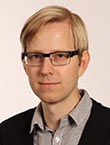Doktorandpresentationer
I forskarskolan ingår sex doktorander. Här nedan kan du läsa om deras respektive avhandlingsprojekt.
Sofia Hort, språkstudier

The purpose of the dissertation is to try to capture and interpret teacher students’ academic writing activities. The study has as an overall view on language and more specifically writing as situated. In this case it gives that writing is studied in the context where it is actually taking place. Studies of the situatedness of writing becomes of greater importance as mobile technologies evolve and as composers usually are becoming mobile, in alignment with a hyper connected, moveable, accessible and information-rich culture. When writing becomes mobile with evolving technologies, the study of writing needs to become moving as well. The aspects of mobility not only become part of the theoretical foundations but also needs to influence the choices of methods to align it with these views.
The thesis focuses three main questions:
- How can writing activities of students be captured, analysed and interpreted?
- What aspects are made relevant by the students as important when writing academia and
- How do students experience this activity?
To capture the participant perspective and the writing activities that is hidden from the researchers immediate grasp, mobile phones, here labelled Social Mobile Devices (SMDs) will be used as a part of the research methodology. The participants will document and report on their own writing activity as it actually happens and gather photos, drawings, audio recordings and notes in the moment of doing something with their academic texts. The aim of the study is to give both empirical but also methodological contribution to the field of academic literacy, putting emphasis on students experiences and handling of academic writing and how research can capture and make sense of these practices.
Christina Larsson, musikvetenskap
Musicology

This study aims to examine how music teachers work with improvisation in music education, what importance they accord it and what functions improvisation can have. In a goal-and results-driven school, with clear grading criteria, it is also pertinent to ask how improvisation is to be assessed. The methods to be used in this study consist firstly of interviews with music teachers about their perceptions of improvisation in the classroom. These are then subsequently followed-up by participatory action research, in cooperation with music teachers. The theoretical framework is based on a pragmatic approach and educational theories with references to especially John Dewey and Gert Biesta.
Andreas Mårdh, pedagogik
Education

The Logics of Teaching Gender History
The purpose of the dissertation is to account for and explain those particular didactic and political practices concerned with fixating the meaning of gender history as an educational content. The specific research questions addressed within the thesis are as follows:
- What counts as viable, legitimate and teachable gender history within different didactic and political practices?
- How is the constitution of gender history negotiated within a given practice and how does this relate to the acts of identification carried out by the individuals partaking?
- Why and by what reasons do the participants immerse and invest themselves in the practices of constituting gender history?
The dissertation consists of two empirical sub-studies each concerned with the above mentioned questions, albeit in different contexts. The first case specifically addresses the political practice of constituting the subject content as it is manifested in the commentary sections of two online, right-wing and populist newspapers. In stark contrast to the first case the second sub-study is somewhat more representative of didactical practices within an institutionalized educative setting. This case is consequently concerned with the classroom practices of teaching gender history within the upper secondary schools of Sweden. The data for the second case is generated through the use of video recordings and as such it is the interaction and discussions between teachers and students that are of primary analytical significance.
By articulating an understanding of education and gender history within the framework of Political Discourse Theory the thesis also proposes to make a methodological contribution to the field of history didactics, in which hermeneutical approaches is predominantly used. Theoretical inspiration is therefore drawn from Jason Glynos & David Howarth's use of the concept of logic along with the understanding of gender history put forward by Joan Wallach Scott.
Elin Sundström-Sjödin, pedagogik
Education with a special pedagogic interest in Literature

Asgeir Tryggvason, pedagogik

The thesis explores agonism and populism as educational approaches for democratic citizenship education. The starting point for the study is taken in Chantal Mouffe’s theory of agonistic pluralism and Ernesto Laclau’s theory of populism. With the concept of “the political” in the foreground, the thesis focuses on the role of emotions/passions, identity formations and conflicts in the social science classroom.
